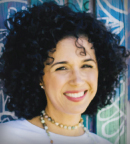Six months before my diagnosis of metastatic colorectal cancer, in 2016, at age 38, I told my mom, “I feel like I’m dying.” Even though more than 10 specialists I had seen over the previous 8 years for unexplained bouts of abdominal pain and bloating, fatigue, and constipation kept assuring me that I was fine, I was in so much discomfort that I was sure I would soon be consumed by whatever was ailing me. It turned out that I was nearly right.
Although I never noticed one of the hallmark signs of colorectal cancer—blood in my stool—I did have other classic symptoms of the cancer, including persistent abdominal discomfort, fatigue, constipation, and black stool. Yet, none of the physicians I saw ever offered me a colonoscopy screening or suggested there was anything seriously wrong with me. It wasn’t until severe heartburn and abdominal pain sent me to the emergency room that I finally learned what had been plaguing me for so many years.
A computed tomography scan of my abdomen showed that I had a 7-cm mass in my colon. A colonoscopy and a biopsy of the removed tumor tissue determined that I had stage I colorectal cancer. Although the diagnosis was absolutely shocking—I was so young to have colorectal cancer—in some ways I was relieved finally to have an answer to all the health problems I had experienced over nearly a decade.

“I’m grateful to be alive and I want to be a voice to help others survive cancer—not just after the initial diagnosis, but throughout the continuity of care and survivorship.”— Tristana Vásquez
Tweet this quote
Surviving Advanced Cancer
I had surgery to remove the mass and 10 inches of my colon and expected to make a full recovery and continue with a healthier life after so many years of disruption and pain. But 2 months after the surgery, a follow-up positron-emission tomography scan revealed a mass in my right lung. The cancer had metastasized, and now I was facing stage IV colorectal cancer. Fortunately, I was able to have surgery to remove the tumor in my lung, followed by six cycles of FOLFOX (fluorouracil, leucovorin, oxaliplatin) chemotherapy. The treatment was difficult—there were times when I wasn’t sure if I was going to die of the cancer or the treatment—but ultimately successful. Today, there is no evidence of disease in my body.
Understanding the Inherited Risks for Cancer
Because there is a history of cancer in my family—my father died of pancreatic cancer and his sister died of stomach cancer—and because I was so young when I was diagnosed with colorectal cancer, my oncologist recommended I undergo genetic testing. The test showed that I have MUTYH-associated polyposis syndrome, a rare, inherited condition that makes me susceptible to adenomatous polyps in the colon and rectum and puts me at increased risk of developing colorectal cancer.
As a result of the finding, I decided to enroll in an observational clinical trial that is investigating inherited causes of colorectal cancer in Hispanic individuals living in Puerto Rico. I’ve also become active in advocacy, helping newly diagnosed patients with cancer navigate the complicated labyrinth of oncology care in my country and find support. The work has been rewarding, and I’m now actively involved in the broader Hispanic community in Puerto Rico to raise awareness of young-onset colorectal cancer and the importance of early screening if there is a family history of the disease or if symptoms of the cancer appear.
Making Peace With Death
I know this may sound strange to say, but cancer has made my life more blissful. Don’t misinterpret this statement; I don’t wish cancer on anyone. The disease has left me with ongoing neuropathy in my hands and feet, pain throughout my body, fatigue so severe I can sometimes only work an average of 5 hours a day, and a constant fear of a cancer recurrence. But it has also given me a resiliency I didn’t have before. The moment I decided to make peace with death, I stopped the war I had with life. I’m more invested in the here-and-now rather than thinking too far ahead into the future.
I’m grateful to be alive and I want to be a voice to help others survive cancer—not just after the initial diagnosis, but throughout the continuity of care and survivorship. The fear of cancer does not end after you finish treatment. In fact, in some ways, that is the scariest time for survivors because family members and friends consider you “cured” and move on with their own lives, and you are no longer in the protective cocoon of your medical team. You are back on your own, and that takes some adjustment. As part of my advocacy efforts, I’m also active in raising awareness of the need for more research aimed at improving the quality of life for cancer survivors.
I don’t know how life will unfold for me. I know that I don’t have control over what happens in the future. All I can control is how I react to whatever comes my way and deal with the consequences.
Being of service to others is helping me regain the power over my life that was lost during the years when I didn’t know what was happening to me, and it has given me a renewed sense of purpose. Although my life is very different now, I find joy in everyday life experiences and I don’t take anything for granted. It’s the only way to live in freedom and bliss.
Ms. Vásquez is a business consultant and patient advocate. She lives in San Juan, Puerto Rico.
Editor’s Note: Columns in the Patient’s Corner are based solely on information The ASCO Post received from patients and should be considered anecdotal.

